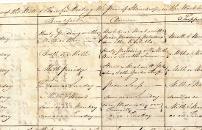Information about County Durham Poor Law records in Durham County Record Office and elsewhere.
Poor Law Records before 1834


The Poor Law was established by Acts of 1597 and 1601, and placed responsibility for the poor in the hands of the parish with churchwardens or parish overseers collecting poor rates and allocating relief.
The main documents where you might find information are:
- Apprenticeship Records
- Bastardy bonds and maintenance orders
- Churchwardens’ Accounts
- Overseers’ Accounts
- Removal Orders
- Settlement Certificates
- Vestry Minutes
These records were usually kept in the Parish Chest and have been transferred to the Record Office. Search the Catalogue for details of any surviving Poor Law documents in the Church of England parish collections. Select Ecclesiastical Parish Records from the Category drop-down list.
You will find more information on the history of the Poor Law on The Workhouse website.
Poor Law Records 1834-1929
In 1834 The Poor Law Amendment Act, also known as The New Poor Law, was introduced. A new system was created which removed the onus of dealing with the poor from individual parishes and gave it to Poor Law Unions. The unions were comprised of groups of parishes. Each union, administered by its own board of guardians, provided both outdoor and indoor relief to the poor, the latter given in the workhouse.
There were 15 Poor Law unions in County Durham. Some material for those unions identified with an asterisk (*) is held in the Record Office. Search the Catalogue for details of our holdings for each union (ref. U). Type Poor Law Union in the Keywords box.
- Auckland*
- Chester-le-Street*
- Darlington*
- Durham*
- Easington*
- Gateshead
- Hartlepool
- Houghton-le-Spring*
- Lanchester*
- Sedgefield*
- South Shields
- Stockton*
- Sunderland
- Teesdale*
- Weardale*
You will find lists of unions with the places contained in them in local county directories.
You will also find material for Chester-le-Street, Easington, Gateshead, South Shields and Sunderland Poor Law Unions deposited with Tyne and Wear Archives.
Records for Hartlepool Poor Law Union are at Teesside Archives
Public Assistance Records 1930-1948
In 1929 Unions and Guardians were abolished and their functions were transferred to public assistance authorities run by county boroughs and county councils. Many workhouse buildings became Public Assistance Institutions and continued to provide accommodation for the elderly, chronic sick, unmarried mothers and vagrants.
Conditions in the institutions improved very slowly during the 1930s and 1940s and with the introduction of the National Health Service in 1948 many of the former workhouse buildings continued to house the elderly and the chronic sick. You will find details of the records of some Public Assistance institutions in our Poor Law Union and Hospital catalogues. Search the Catalogue.
More workhouse and Poor Law Information
There is more information on the history of the workhouse and the Poor Law on The Workhouse website and workhouse records on The National Archives website.
There is also a guide to Poor and the Poor Laws in The National Archives In-depth research guides.


